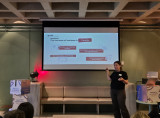The city of Helsinki releases all of its data as open data for anyone to use. What is special? Open data is more than public data. Open data is public data which has been been released for anyone to use freely as machine-readable, structured format, with open license and free of charge.
The city government has already released hundreds of public data sets via Helsinki Region Infoshare (HRI) service. Data which is constantly collected all around the city. Think of data about the urban environment, the use of public services, traffic noise levels, population projections etcetera.
Helsinki wants to make this data available to people, other than civil servants. They are making it freely available to the public, for everyone to use. Entrepreneurs, application developers, residents, journalists etc. Open data makes the government more transparent and promotes democracy. And it enables the creation of new services that make life easier for the citizens of Helsinki.
Read more about these services in the article below:





Case Helsinki is about collecting data and sharing it to those who would like to use them to their purposes and I don't consider this as threat to intellectual ownership any how. My personal opinion as Helsinki born is, that is very good example how city can be more transparent by opening data to all instead of civil servants, just like Egbert wrote in his post.
Globally we collect a lot of data and for what purpose? Stored in a website under password? The idea is to learn, grow and utilise and we also publish university thesis to the net.
Open data is to help citizens, start ups, entrepreneurs, elderly, students, all and everyone with out any categorisation or restrictions to find more information of their city, services, infra, service providers, persons, organisations, schools, ..... .Of course there are lot of data, that is not open, but little by little we find more use for open data than vice versa. At the same time, it is also an challenge for City to spread the word that you can have an access to many new sources and help people to find their path to these. For this purpose, new vacancies and have been crated and innovation projects launched.
I can understand the worry, but not in this case
Opening data is very desirable. The same applies to results of research at public universities and comparable institutions. At the same time we have to rethink the desirability of protection of intellectual ownership. Many consider this a a contribution to innovation, on the contrary, others feel that it frustrating innovation by limiting knowledge spill-overs. I am curious about the opinion of others.